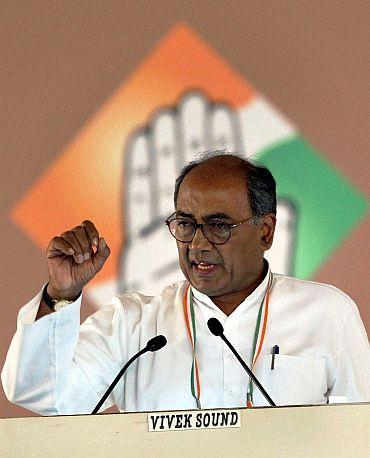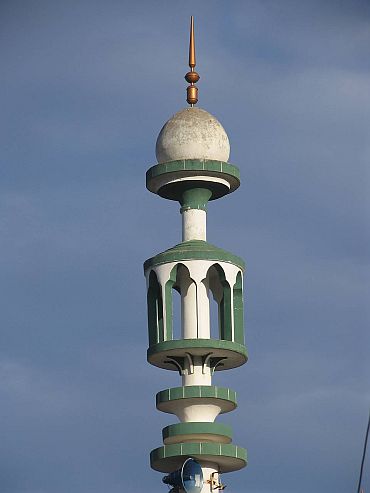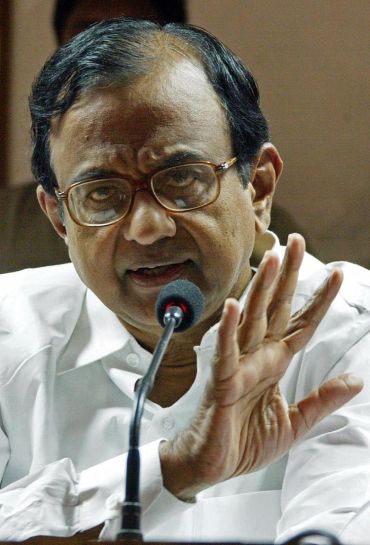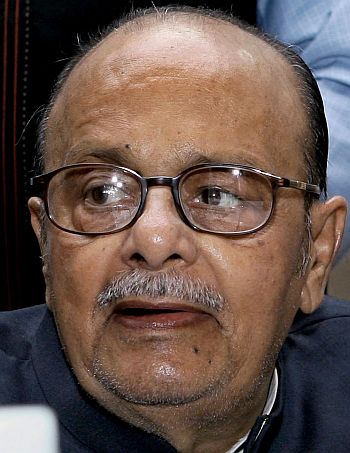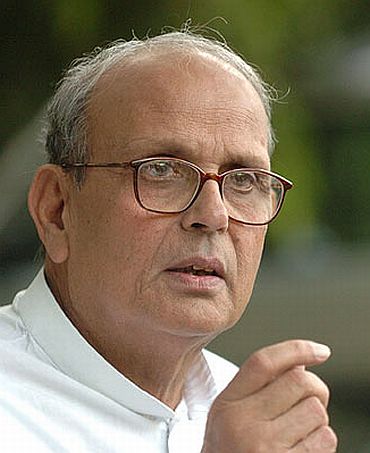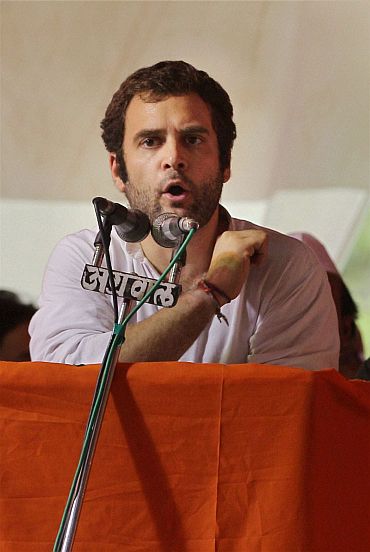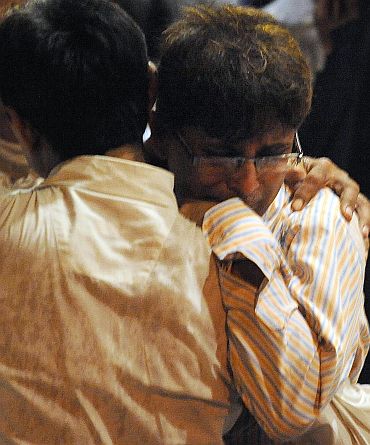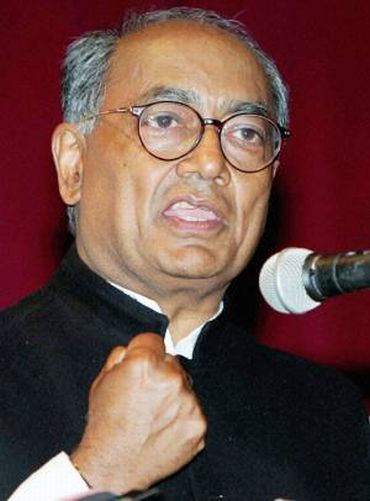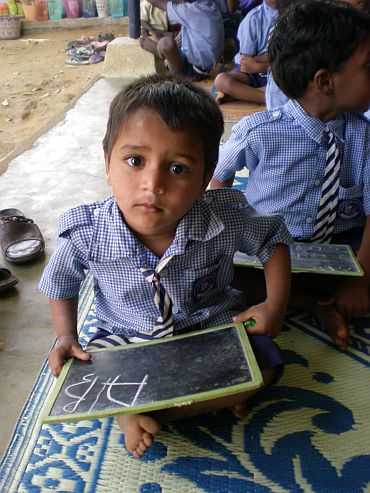 | « Back to article | Print this article |
Does Digvijay Singh battle for himself or Rahul?
Sheela Bhatt tries to make sense of the rising stature of Congress leader Digvijay Singh and his brand of politics.
There is no doubt that Congress General Secretary Digvijay Singh's full-frontal attacks on Hindutva forces and attempts to woo Uttar Pradesh's Muslims have catapulted him onto the centerstage of Indian politics.
"Digvijay's transition from state to national politics is fascinating," says Rashid Kidwai, author of the newly-published book on the Congress party, 24, Akbar Road. "It's a result of great determination, realpolitick and astute political posturing."
Singh's hardline politics on caste and communal issues has thrown up three major pointers. First, many Congressmen vow that he is fighting his own war and that he is not carrying any brief from Congress President Sonia Gandhi or her son Rahul Gandhi.
But in the conspicuous absence of any attempt by Sonia or Rahul to distance themselves from Singh's brazen statements, it's difficult to believe those Congress party men who are upset with his emergence.
Click on NEXT to read further...
Does Digvijay Singh battle for himself or Rahul?
India does not know if Digvijay Singh's hard line is also the Gandhi family line.
Second, will his unabashed alignment of the Congress party with Uttar Pradesh's Muslims bring the party votes? To get the Muslim votes in UP en bloc is a difficult task and difficult because of the volatile and complex ground situation in the politically key state that goes to the polls next year. Many Muslim leaders in UP claim that there is a perceptible tilt in favour of the Congress.
But Digvijay Singh has been criticised in the state's Urdu media.
'Let Muslims live in peace,' said a recent editorial in an Urdu daily newspaper. 'Digvijay should not create an exclusive Muslim bogey in 21st century India.'
While it is unclear if they are buying, it is clear that Digvijay Singh is selling dreams to Muslims and Dalits. It's a gamble with high stakes.
Third, on both the above questions, Congress Working Committee members are divided. Some senior Congress party leaders told rediff.com that Singh is moving ahead "daringly and dangerously".
Does Digvijay Singh battle for himself or Rahul?
He has formidable enemies within his party, starting with Union Home Minister P Chidambaram. Although key Sonia aide Ambika Soni supports Singh, many senior leaders, including Defence Minister A K Antony, Sonia's powerful political secretary Ahmed Patel, and other party office bearers have reportedly expressed doubts over Singh's strategy.
The Prime Minister's Office is also anxiously watching Singh's moves.
"Why is he (Digvijay) strengthening the Bharatiya Janata Party?" asked a PMO official close to the prime minister.
Digvijay Singh lost the post of Madhya Pradesh chief minister in the 2003 assembly election, after 10 years of rule. His defeat was ignominious. He didn't provide water, roads, power, education or health to the state he ruled.
Does Digvijay Singh battle for himself or Rahul?
Within the Congress party, there were too many claimants for the state leadership and Singh had too many competitors and enemies. His move to not fight any election 14 years after the 2003 debacle was a most clever ploy to save himself.
Singh seems to have made a cocktail of two other leaders' moves -- those of Arjun Singh after the Churhat lottery scam to remain relevant in the Congress party's Delhi darbar, with the tricks of former prime minister V P Singh, who countered the Ram temple issue with Mandal (caste-based reservation) politics.
Actually, Singh is following in the footsteps of his guru (Arjun Singh) and experimenting with the political practices of his distant relative (V P Singh).
Arjun and V P Singh's agenda of inclusive growth was attractive, their ideals of justice for the minority and the downtrodden were lofty and their articulation was cerebral, though neither Arjun nor V P Singh were very far from the social reformers of the Gandhian era.
Does Digvijay Singh battle for himself or Rahul?
"India has never been the same since the day when Ayodhya was pitted against Mandal," explains a critic of Digvijay Singh, who does not wish to be named for this feature. "The country remained divided and it has taken a long time for polity to shift the focus of the nation from caste and communal instincts to development. Digvijay wants India to return to the streets."
Part of that scary prediction seems true if one sees the rage of BJP workers in Madhya Pradesh against Digvijay Singh.
Digvijay Singh, it seems, is determined to play V P Singh -- without rebelling like V P did. It is unclear how much he will succeed, but it is a game that will affect all of India -- and not just Uttar Pradesh. Like V P Singh, Digvijay Singh is promising to bring together, once again, the Dalit-Muslim combination in favour of the Congress. Even trying to brew that cocktail has given Digvijay Singh a high.
Does Digvijay Singh battle for himself or Rahul?
He left Madhya Pradesh unceremoniously, but today he is bigger than any of the state's Congress leaders, including Kamal Nath and state party president Suresh Pachauri.
Eight years down the line, Digvijay Singh is now famous as Rahul Gandhi's mentor. He is also infamous as a man who will stoop to any level to hit out at his political rivals. He vowed not to enter electoral politics, but has exhibited more political ambitions than just fighting an election.
Just 10 years ago, he was one among many Congress party leaders; that too a 'state leader'. Today, he is the most sought after leader after Sonia and Rahul, within the media at least.
"What's wrong with what he is saying?" asks Madhusudan Mistry, a Congress party leader from Gujarat. "Are Muslims not suffering? Can't a Congress leader talk about them?"
But Digvijay Singh's strategy seems to be aiming more at headlines that creating social change.
He attracts eyeballs wherever he goes. He has stirred up Uttar Pradesh's political scene by sending Rahul to the homes of Dalits.
Digvijay Singh is surely the hottest topic on Internet message boards and forums discussing India and Indian politics.
Does Digvijay Singh battle for himself or Rahul?
The evidence is right on rediff.com where Singh's statement about Mumbai blast has attracted more than 5,000 responses from readers in the last five days. (Link 1 Link 2)
Digvijay Singh, like Arjun Singh and V P Singh, belongs to the Thakur clan. It's hard to imagine that his father was a leader of the Hindu Mahasabha. His family members were middle-level sardars of the Gwalior royal family, the Scindias. Unlike many Thakur leaders in Indian politics, Digvijay Singh connects with 'ordinary people'.
A devout Hindu, he and his wife Ashadevi visit temples and religious leaders together. His son Jayvardhan Singh is training under Montek Singh Ahluwalia, deputy chairman of the Planning Commission.
.
Does Digvijay Singh battle for himself or Rahul?
He is also media savvy and adept at expressing political messages through nuances. He is comfortable in the language that North India understands. His supporters think his nuances are such that the majority community will not be isolated even while he cajoles the minorities.
None of the other top Congress party leaders -- Sonia Gandhi, Prime Minister Manmohan Singh, Rahul, Finance Minister Pranab Mukherjee, Antony and Chidambaram -- have the grasp over the Hindi language -- and consequently the Hindi heartland -- that Digvijay Singh has. He is articulating the Congress party's politics for North India. From his views on the Batla house police encounter in New Delhi to declaring support for Azamgarh's Muslim youth caught in terrorism-related cases, Digvijay Singh minces no words. He gives provocative statements against the RSS.
"In Gujarat, Chief Minister Narendra Modi remains unbeatable because of the soft-Hindutva of Congress party leaders in the state. Digvijay's politics is what the Congress party needs," says a senior Congress party leader who does not wish to be named.
In the 'semifinal' that the Uttar Pradesh election next year promises to be (before the final, the next general elections), if Digvijay Singh can conjure a Congress party victory out of a combination of Dalit-Muslim-poor farm labourers-Thakur votes, he will be on the path of V P Singh and Arjun Singh.
Does Digvijay Singh battle for himself or Rahul?
It is also a fact that Digvijay Singh looks brazen because his party and his government has done little in the last seven years in actual terms to help poor Muslims get better education, jobs or health care, despite the Sachar Committee report.
"Digvijay Singh will meet his Waterloo in Uttar Pradesh," says Kamal Faruqui, national secretary of the Samajwadi Party and member, All India Muslim Personal Law Board. "He wants Dalit-Muslim votes in Uttar Pradesh, but the SP will surely hold on to its Muslim voters because they can see that in the last seven years of United Progressive Alliance rule justice has been totally denied to Muslims."
Kidwai agrees that there is a difference between talk and action.
"During his 10 years of rule in MP and seven years as (Congress) general secretary in New Delhi, Digvijay has not made any big difference to the lives of Muslims. So, when he speaks for Muslims the actions of his government don't match," says Kidwai.
Does Digvijay Singh battle for himself or Rahul?
There may be a longer-term planning in Digvijay Singh's diatribes. It is now widely believed that Manmohan Singh is unlikely to continue as the Congress's prime ministerial candidate beyond 2014. Rahul Gandhi is the obvious -- read dynastic -- candidate, but if he is not in the fray -- for whatever reason -- then obviously the post of the Congress party's prime ministerial candidate for 2014 is up for grabs.
That leads to a credible question: Is Digvijay Singh batting for himself or for Rahul Gandhi?
Congress leaders seem divided on that.
"I can assure you that Digvijay is playing his own game for himself," says a senior leader who understands the Gandhi family politics well.
But there are others who argue that if Digvijay Singh's gamble has a chance of paying off in UP, why should the Gandhi family stop him? They will keep quiet and watch him mobilise the crowds. If he does it, the win will be credited to Rahul Gandhi. If he can't deliver, he will go unsung like Arjun Singh.
All eyes then, on the UP semifinal. It could be Digvijay Singh's do-or-die match.
